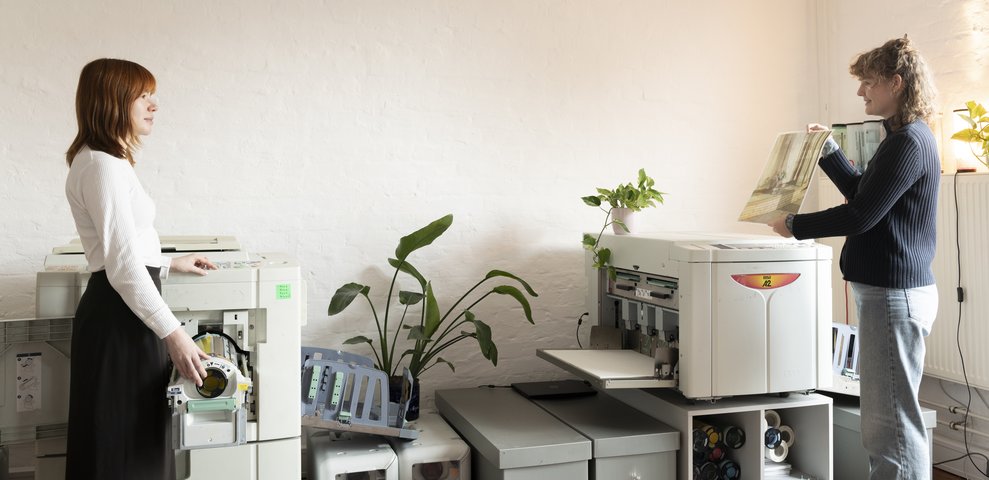Druckpool

The Druckpool is the first and so far only student-run workshop at the University of the Arts Bremen. The project is supervised by Andrea Rauschenbusch, Professor of Communication Design and Corporate Design, and Tania Prill, Professor of Typography. The Druckpool is a risography workshop, experimental field and meeting place all in one. Here, students can realise their own works in the Riso printing process with energetic and professional support. In addition to three different risographs, the workshop's inventory also includes a cutting plotter, a stack cutter and a coil binding machine.
Risography is similar to screen printing and is stencil printing carried out using the cylinder printing method. Compared to other printing methods, risography is particularly environmentally friendly as the ink is applied to the paper without the use of chemicals or heat. The soy-based ink used is more environmentally friendly than conventional printer ink, and the master sheets are made from banana leaves.
Risographs look like photocopiers but work more like screen printing technology. In screen printing, a rubber squeegee is used to print the ink through a fine-mesh screen onto the material to be printed. In the risography process, master foils are created instead. The master foils ensure that the ink gets to the right places on the paper. Since only one colour can be printed at a time, the risograph creates a master foil for each colour. Printing is not done with CMYK, but with spot colours. By selectively overlaying the colours, unique colour mixes and effects can be created. Every Riso print is unique and never perfect. The combination of screen printing and risography can also lead to exciting results.
The Druckpool provides three different risographs: the RISO RZ 200 EP, the RISO MZ 770 E and the RISO A2. The respective devices can print in three different formats and more than 20 colours. In addition, a wider range of paper types in different colours and thicknesses is available. Users can purchase paper on site or bring their own. The paper used should weigh between 80 and 260 g/m². The ink soaks in best on open, uncoated paper. In addition to the risographs, students can also use a cutting plotter, a stack cutter and a coil spiral binder. While the stack cutter is the perfect helper in preparing the print, the coil binding machine provides the colour-matched binding. The attractive coil bindings are supple and flexible.
A Riso print needs to be well prepared, and the workshop supervisors are always there to support the users. Those who wish can develop their own skills with the so-called "Riso driving licence", which is offered on request. The print pool is not only a risography workshop, but also a place for experimentation and encounters. At events like "Riso and Chill", university members can come together, exchange their design ideas and realise them in community. The workshop is also regularly used to print in-house the results of first-semester courses or university information material such as first aid.
Contact
- Email druckpool@hfk-bremen.de
- Website druckpool.hfk-bremen.de
- Instagram @druckpool
- Phone +49 421 9595-1351
- Location Speicher XI
- Room 1.4.014
Opening Hours
- Tuesday 10:00 a.m. – 1:00 p.m.
- Wednesday 2:00–05:00 p.m.
- Further dates on request